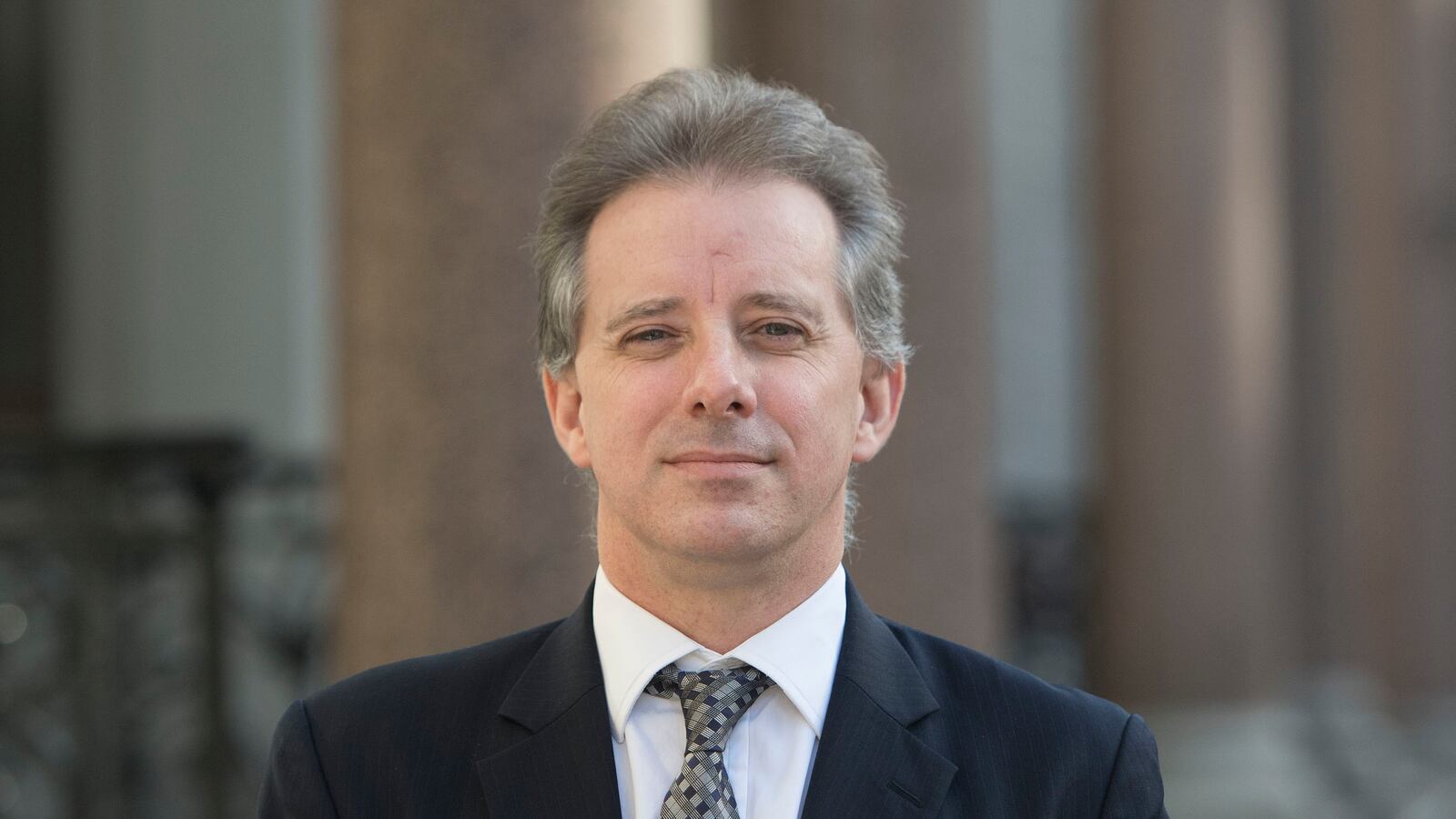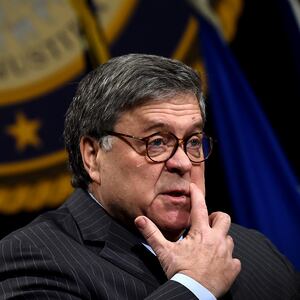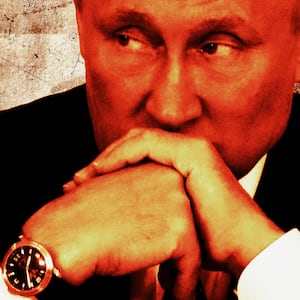In a much anticipated report made public Monday, Justice Department Inspector General Michael Horowitz exonerated the FBI from allegations of abuse of power and political bias against the Trump campaign during its initial investigation of the Trump-Russia connection, while at the same time criticizing some FBI agents and lawyers for unprofessionalism and sloppiness.
The villain of the report, if there is one, is Christopher Steele, the former British MI6 (foreign intelligence) officer whose dossier, a collection of raw research memos paid for by the Democratic Party, was part of the evidence used to obtain a secret wiretap warrant to monitor Trump campaign aide Carter Page. The dossier’s allegations also propelled the FBI to intensify its Russia probe, which was already under way.
Yes, we're talking about that dossier. It was never intended to go public in its raw form, which Steele long ago conceded might only be 70 percent accurate. And when it did hit the media, published by BuzzFeed in January 2017 days before Trump’s inauguration, many headlines focused on an allegation by Steele’s sources that Trump had hired prostitutes to urinate on a bed the Obamas had slept in at a Moscow hotel. The incident supposedly had been recorded on video, but it has never been corroborated independently, and apparently was not part of the FBI investigation.
Steele, who was grilled in London for two days last June by the Horowitz team, is the bête noire of Trump supporters. The president has called the Steele dossier a “pile of garbage,” and through repetition he and his Republican defenders have worked to make any reference to it toxic, as we’ll discuss below.
Given that the thrust of the Horowitz report exculpates the FBI from the “deep state” conspiracy theory being pushed ad absurdum (and some would say ad nauseam) by the GOP faithful, and the evident hostility Attorney General William Barr has shown to his own inspector general’s report, the vilification of Steele may be a sop to the conspiracy theorists.
Remember that very recently, in an effort to take the blame off Russia for 2016 election interference, some Trump allies even went so far as to claim that the dossier was cooked up by the Ukrainians as part of a Democratic plot to undermine Trump’s presidential candidacy at a time when virtually no one though he was likely to win.
According to former Energy Secretary Rick Perry, Rudy Giuliani has been touting this theory. And Devin Nunes, the top Republican on the House Intelligence Committee, posed this question to Amb. Gordon Sondland in his closed-door testimony during the impeachment inquiry hearings: "You've heard that the origins of the Steele dossier were from Ukraine, many of the origins in the original Steele dossier were from Ukraine?" Sondland did not reply.
Now adding to the debate, but not always elucidating it, we have a new book by Glenn Simpson and Peter Fritsch, Crime in Progress: Inside the Steele Dossier and the Fusion GPS Investigation of Donald Trump. Published two weeks ago, it is already the number one New York Times nonfiction print and e-book best seller. The authors founded the investigative and consulting firm Fusion GPS, which hired Steele to investigate Kremlin connections with the Trump campaign, and the book is full of tantalizing details.
The authors claim, for instance, that Nunes, who has been on an obsessive crusade to discredit the dossier, made a secret trip to London in August 2018 in order to undermine Steele by getting derogatory information about him from British intelligence officials. “This Nunes is a proper clown,” Steele told Fritsch, and the congressman’s alleged efforts proved unsuccessful.
The depictions of Steele in the Horowitz report and in Crime in Progress would seem at first glance to be completely contradictory. Simpson, who declined a request to be interviewed by the Horowitz team, and Fritsch laud Steele’s credentials, while the Horowitz report casts doubt on his judgment. But the political and factual details are rather more nuanced.
Russia expert and former Trump National Security Council aide Fiona Hill referred to the Steele dossier as a "rabbit hole" in her closed deposition during the impeachment hearings, and later was prodded by Nunes during her public testimony to repeat the comment. Never mind that Hill also said in her opening statement on November 21 that the theory that Ukraine, rather than Russia, interfered significantly in our 2016 elections was "a fictional narrative that has been perpetrated and propagated by the Russian security services."
For authors Simpson and Fritsch, Hill's remarks about Steele and the dossier were less than welcome. Appearing on Meet the Press, the authors, expressed puzzlement at her comments and suggested that Hill was not a specialist on "disinformation."
They may have a point. In her closed deposition, Hill expressed concern that Steele, who worked for MI6 in Moscow under diplomatic cover in the 1990s, might "have been played" by the Russians and fed "some kind of misinformation." (One wonders whether Hill had advance knowledge of the Horowitz report, which notes that “the FBI assessed the possibility that Russia was funneling disinformation to Steele.”)
But Hill, with a reputation for outstanding scholarly writing on Russia, has expertise that is very different from that of Steele, who spent 22 years in MI6. From 2006 to 2009 Steele headed MI6's Russia desk, where he led the agency's investigation of the 2006 poisoning in London of Alexander Litvinenko. And according to Steven Hall, former chief of the C.I.A.'s Central Eurasia Division quoted in The New Yorker, MI6 is "second only perhaps to the U.S. in its ability to collect intelligence from Russia.” Some would say that when it comes to gather human intelligence, “Humint,” the Brits are better.
In a 2016 article, when she was still at Brookings, Fiona Hill wrote: "Putin’s Russia is a one-man show. … [His] circle is extremely narrow and difficult to penetrate, even for supposed Russian political insiders.” According to her analysis, this Russian president’s power is unchallenged: “There is no oligarchy or separate set of economic, business, or political interests that compete with Putin."
Hill's views of how smoothly Putin’s inner circle works may have led her to underestimate Steele's ability as an experienced Humint collector to ferret out reliable Kremlin sources, who, having an axe to grind with Putin, were willing to reveal secrets.
Steele seems to have done just that.
According to Simpson and Fritsch, one of Steele’s sources was "among the finest he had ever worked with, an individual known to U.S. intelligence and law enforcement." And they note that, as of September 2019, U.S. officials confirmed that the CIA had “a human source inside the Russian government during the campaign, who provided information that dovetailed with Steele’s reporting about Russia’s objective of electing Trump and Putin’s direct involvement in the operation.”
So who was that source? In the dossier, Steele cites a senior member of Putin's Presidential Administration, who confirmed many of the details about the Kremlin's intervention in the U.S. presidential campaign, including advice to Putin provided by his top foreign policy adviser, Yuri Ushakov.
It is reasonable to speculate that same source was the CIA informant the agency reportedly exfiltrated from Russia with his family in July 2017 and who now lives in the U.S. Although this asset’s name was not revealed by U.S. authorities, the Russians have identified and denigrated a suspect who, we know, served as second secretary in Russia's Washington Embassy when Ushakov was the ambassador and was working directly under Ushakov in Russia’s Presidential Administration in 2016. He was living under his own name in Virginia, but he has since kept a much lower profile.
The Horowitz report says a Russian-based "primary sub-source" for Steele's dossier, interviewed by the FBI in January, March and May 2017 made statements that "were inconsistent with multiple sections of the Steele reports."
But a closer look at the details provided by the report shows that most of Steele's claims about what went on between the Kremlin and the Trump campaign were not refuted.
For example, the “primary sub-source” told the FBI that another source mentioned by Steele as confirming the story about Trump's alleged sexual activities at Moscow's Ritz Carlton Hotel did not provide this confirmation, but noted that "other sub-sources were responsible for the Ritz Carlton reporting." And indeed Steele cites several others for his reporting.
The Horowitz report also cites discrepancies in Steele's accounts about Trump campaign aide Carter Page. These are important with respect to the FISA warrants obtained to tap into Page’s communications. But Page had been of interest to the FBI for a long time.
Back in 2013, a bug the Feds had placed in the New York office of the SVR, Russia’s foreign intelligence service, picked up two operatives talking about a man subsequently identified as Page. FBI agents questioned him several times after that, but prior to Page’s work with the Trump campaign. The SVR operatives recorded by the FBI had seen Page as potentially useful, but one of them concluded: “I think he is an idiot.”
At issue in the Horowitz report are Page’s alleged secret meeting in Moscow with Rosneft chief Igor Sechin in July 2016. Steele's "primary sub-source" told the FBI that he/she did not provide confirmation of the meeting to Steele until after Steele had issued an earlier memo with descriptions of the meeting, which Steele got from other sources. And the primary sub-source also contradicted Steele's statement that Sechin offered Page a brokerage interest in Rosneft. But the meeting itself is not disputed by the primary sub-source.
Horowitz and his team are harshly critical of Steele’s professionalism. They base their judgments partly on concerns by the Russian primary sub-source about Steele's lack of insight into possible hearsay from sources. But of course, a “primary source” or even a “primary sub-source” has every interest in portraying himself as the exclusive purveyor of accurate information.
In fact, the overwhelming majority of assessments by Steele’s former colleagues in the intelligence and counterintelligence field were very positive, and the FBI officials who did the interviews with them concluded that "many of them…almost without exception said, look, he is truthful. He has never been accused of, nor did anybody think, he is an embellisher, let alone a fabricator." But Horowitz chose to highlight the few remarks about Steele's "poor judgment."
Horowitz notes critically that the FBI could not corroborate much of the material in the dossier. But, given that most of the information came from confidential Russian sources, this is not surprising.
Horowitz includes this statement from Steele, but just as a footnote:
"Following his attorney's review of a draft of this report, Steele advised us through his attorney that it was important to note that his election reporting consisted of information transmitted by word of mouth by a number of individual sources. According to Steele, this is a necessary practice to obtain information in a closed society like Russia and the election reports are descriptions of what certain individual sources, deemed to be reliable by Steele's consulting firm (Orbis), stated. Further, in Steele's view, his election reports should not have been treated as facts or allegations but as the starting point for further investigation, which he said was the intended use of the reports furnished to Fusion GPS. Steele advised us through his attorney that ‘it is with that lens that the accuracy and value of Steele's reporting should be assessed.’"
Horowitz also provides a tantalizing bit about Steele’s previous relationship with a member of the Trump family, which presumably shows that Steele was not out to get Trump when he embarked on his investigation. That family member has been revealed to be Ivanka Trump, with whom Steele established contact several years ago when Steele discussed with Ivanka offering the services of his consulting firm, Orbis, for the Trump Organization’s expansion into foreign markets.
Simpson and Fritsch say that Steele provided them with no fewer than seven sources for the now infamous allegations about the 2013 escapade with Trump and prostitutes in a Moscow hotel room. Among them was a “Source D,” described in the dossier as "a close associate of TRUMP who had organized and managed his recent trips to Moscow." The source was at the hotel at the time and reported also that intelligence provided by the Kremlin on Trump's political opponents was "very helpful" to Trump.
In a later memo, the dossier mentions by name the Azeri businessman Aras Agalarov, who "had been closely involved with Trump in Russia" and "would know details" about Trump's business dealings and sexual exploits in St. Petersburg. Recall that it was Agalarov, along with his Russian popstar son, Emin, who hosted Trump's Miss Universe Pageant in 2013, when the "pee tape" incident was alleged to have taken place, and who later arranged through Emin the infamous meeting in Trump Tower on June 9, 2016, between Trump's campaign and a group of Russians that included the Russian lawyer Natalia Veselnitskaya.
In a recent interview with a Russian media outlet, Emin Agalarov, who was never questioned by the Mueller team, said that during the two days Trump was in Moscow for the Miss Universe Pageant, he "constantly accompanied" Trump. And, according to the Mueller Report, a Georgian businessman texted Trump's lawyer Michael Cohen in October 2016 about compromising tapes of Trump rumored to be held by those associated with Aras Agalarov's real estate firm, the Crocus Group. (The businessman, Giorgi Rtskhiladze, later told Mueller that the tapes were fake.)
Steele was clearly on to something with the Agalarovs, just as he was on to Michael Cohen's secret communications with Kremlin-connected officials, Carter Page's meetings with the top brass of Rosneft, and Michael Flynn's outreach to members of the Putin camp, all of which were borne out later. Steele was also the first to mention Putin’s press secretary, Dmitry Peskov, as a key figure in the Kremlin’s secret liasons with the Trump group.
For Fusion GPS, the 2016 Trump Tower meeting would have unfortunate repercussions. Simpson was at the time doing work for a law firm, Baker Hostetler, which was defending a Russian company called Prevezon on charges by the US government of using laundered money from a 2007 Russian tax fraud to buy Manhattan real estate. The case had been initiated by financier William Browder, whose former tax accountant, Sergei Magnitsky, had discovered the fraud and died in Russian police custody in 2009.
Veselnitskaya was representing Prevezon's owner, Denis Katsyv, a Kremlin-connected businessman, and Simpson was part of her team. According to Simpson and Fritsch, who say they had no inkling of the meeting, when the news about it broke a year later, "Trump’s defense team quickly pointed out that the Trump Tower meeting had come about soon after Fusion hired Steele. For the conspiracy minded, the ties between Fusion and Prevezon were even more evidence of a plot to frame Trump."
Indeed, Nunes brought up this conspiracy theory in his opening statement before Mueller's public testimony in July: “The Democrats colluded with Russian sources to develop the Steele dossier. And Russian lawyer Natalia Veselnitskaya colluded with the dossier’s key architect, Fusion GPS head Glenn Simpson.”
The idea that Veselnitskaya would be colluding actively with Simpson on the Steele dossier implicating Russian President Vladimir Putin in efforts to undermine American democracy is implausible, to say the least. But it is conceivable that her ally Rinat Akhmetshin, who was present at the June Trump Tower meeting, had gleaned some information about the Steele project from Simpson–or vice versa.
Akhmetshin, a Russian-American PR consultant in Washington, and Veselnitskaya were lobbying against the Magnitsky sanctions through an organization called the Human Rights Accountability Global Initiative Foundation (HRAGI).
Simpson, in August 2017 testimony to the Senate Judiciary Committee, acknowledged that he had known Akhmetshin casually for years and at the direction of Baker Hostetler he had passed on some of his research on Browder to Akhmetshin, who before he emigrated to the U.S. had served in Russian military intelligence. Simpson also told the committee that, during 2015-16 he had numerous dinners with Veselnitskaya and Akhmetshin relating to work on the Prevezon case. Two of those dinners were on the evenings before and after the Trump Tower meeting.
Whatever the Russians might have picked up about Fusion's work with Steele, Simpson and Fritsch appear incredibly naïve about Veselnitskaya. They write that "the truth was, Fusion did not know much about Veselnitskaya. Simpson had met her only a handful of times, sometimes only exchanging pleasantries. … Veselnitskaya hadn’t come across as some Kremlin power broker, and there was no reason to suspect that she had the political juice to get a meeting with the leadership of the Trump campaign."
Really? Fusion had Russian speaking researchers on its staff. A google.ru search would probably have revealed that Veselnitskaya had defended the FSB counterintelligence service in land disputes and was a protégé of Prosecutor-General Iurii Chaika, Putin's long-time ally, who sponsored the Prevezon defense and also asked his friend Aras Agalarov to arrange the Trump Tower meeting, where the Magnitsky sanctions were discussed.
Simpson told the judiciary committee that Fusion did not believe that his work gathering dirt against Browder–which included rounding up an audience for the showing at the Newseum of a film by Andrei Nekrasov attacking Browder and distorting the entire Magnitsky case–was being done on behalf of the Russian government. But the main reason that the Kremlin was helping out Prevezon was to make a case against the Magnitsky sanctions that Browder had instigated.
Still, Simpson and Fritsch deserve a lot of credit for enlisting Steele, whose revelations, however flawed, were so important to our knowledge of what the Kremlin was up to with our 2016 election.
One big question is why Mueller in his lengthy report did not do more to follow up on the Steele allegations.
After all, as Fritsch observed in his and Simpson’s interview on Meet The Press: "You can't actually catch rabbits without going down some rabbit holes. So you need to actually follow leads where they take you."







